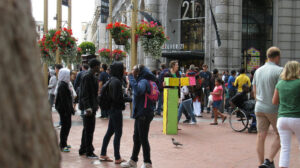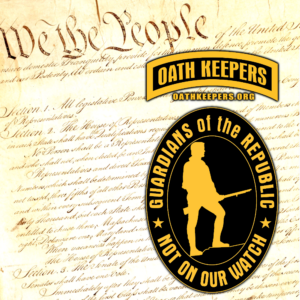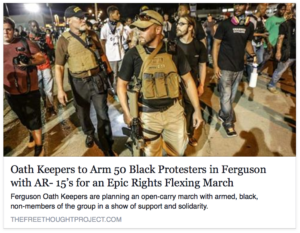A thoughtful response to a March 2010 Mother Jones article, “Oath Keepers and the Age of Treason,” which has re-circulated as Oath Keepers appear in Ferguson.
Key Personal Perspective/Bias, and Background…
I remember vividly when a big 2010 Southern Poverty Law Center (SPLC) report titled “Rage on the Right” came out along side this Mother Jones (MJ) article. It was given great attention by all my regular media outlets of all stripes, mostly feeding fear of the right from the left. SPLC promoted a map/list of “Hate groups” side-by-side with “Patriot groups,” which I thought blurred the lines and contributed to a narrative of blanket-demonizing “extremist” positions, even if peaceful. Guilt by association. That said, I will not blanket-demonize the SPLC, as I know they do some good work on other issues.

This was personal, because in the year before this report, I had actively participated in the the Maryland and San Francisco chapters of We Are Change, which appear on the “Patriot Groups” list. Post-partisan We Are Change chapters actually accounted for over 100 of the 512 “Patriot groups” on their list. Some 50 Oath Keepers chapters were listed along side We Are Change on this list of “Patriot groups” framed as just one step away from the list of “Hate groups” many of which are indeed literally neo-nazis and objectively terrible ideas and efforts. Oath Keepers founder Stewart Rhodes is quoted in this MJ article as describing his similar reaction:
SPLC’s Mark Potok “wants to lump us in with white supremacists and neo-Nazis, and of course make the insinuation that we’re the next McVeigh.”
As anyone who knows me would guess, I would not be involved with anything violent. We Are Change takes it’s name from the famous Ghandi quote and is roughly a decentralized network of street activists and citizen~journalists (http://wearechange.org/about/mission-statement/). Most We Are Change participants (like myself) do embrace the study of alternative analyses (AKA conspiracy theories), and found it to be a constructive outlet to work on these issues and to question everything. As with every movement, the full spectrum of participants I met included plenty who were sloppier in doing their own homework to hash out nuances/uncertainties, and let their confirmation bias run wilder than I prefer. But we shared enough core values, underlying concerns, and hopes for the future.
 Oath Keepers has largely employed a preventative strategy, reminding and educating active military and police about their oaths to the constitution before they must decide whether or not to follow unconstitutional orders. At least this core principle seems tough for most to argue with, and should in no way be considered “extremist”. But here are the more debatable details, the Declaration of 10 Orders We Will NOT Obey: http://oathkeepers.org/oktester/declaration-of-orders-we-will-not-obey/ (https://en.wikipedia.org/wiki/Oath_Keepers). For those of us thinking of ~’revolution’, oath-keeping by police and military is absolutely critical to accomplish a ‘peaceful~revolution’. The police and military are absolutely part of the 99%.
Oath Keepers has largely employed a preventative strategy, reminding and educating active military and police about their oaths to the constitution before they must decide whether or not to follow unconstitutional orders. At least this core principle seems tough for most to argue with, and should in no way be considered “extremist”. But here are the more debatable details, the Declaration of 10 Orders We Will NOT Obey: http://oathkeepers.org/oktester/declaration-of-orders-we-will-not-obey/ (https://en.wikipedia.org/wiki/Oath_Keepers). For those of us thinking of ~’revolution’, oath-keeping by police and military is absolutely critical to accomplish a ‘peaceful~revolution’. The police and military are absolutely part of the 99%.
It’s worth noting that Edward Snowden’s words describe him as a sort of IT Oath Keeper (contracting for the intelligence wing of military). His whistle-blowing followed order #2 on the Keepers’ list: “2. We will NOT obey any order to conduct warrantless searches…”
Anti-Obama?
Back the Mother Jones article specifically, which was published the same month as the big SPLC report… It is worth mentioning that there existed a much more principled “Tea Party” movement tangential and close to the Ron Paul/End The Fed community, long before 2009 when Glenn Beck and mainstream GOP co-opted, and it became the shit show we’ve known since. Similarly, all of the Oath Keepers’ concerns emerged before Obama was even a candidate, during the Bush years of constitution shredding. While I can understand grouping “Birthers” as pretty explicitly anti-Obama, and there are clearly still large race issues in this county, it is a huge leap to claim a dominant causal relationship between the all the groups discussed and the president’s skin color.
In the alternative thought communities which foster groups like Oath Keepers, one of the key observations is that executive powers (especially those related to national security) have had a net expansion with each presidency. Because of this, every president is technically the most dangerous/powerful president yet… if you are concerned about the expansion of tyranny. “Tyranny,” like most big concepts (including ‘capitalism’ and ‘socialism’), is rarely acknowledged as a gradient, not black-and-white. Analog, not digital. I like the balance in the author’s comment that she found a full spectrum of people involved in Oath Keepers, from “dangerous conspiracy theorists” to “crafty intellectuals.” To be seriously concerned about these issues, one usually ascribes to at least some subsets of conspiracy theories and rhetoric (I lean towards agreeing with maybe half of those peppered throughout the article). I do think that studying comparisons to German history is far too important to be brushed off as hyperbole, as such history is more likely to repeat if ignored. Nuremberg established precedent that it is not an acceptable excuse to say ‘I was just following my superior’s orders,’ which explicitly ties in with what Oath Keepers are thinking about.
The urgency of these general concerns is also at least as strong for me now as it was during the Bush years. I voted for Obama in ’08, and still think the single best thing he has done was his “More Perfect Union” speech on race. I can only speak for myself: I waited to get publicly involved in these issues until after Obama was elected… after I started losing ‘hope’ (when he chose his cabinet). After seven long years of hoping the next president would reverse Bush’s national security insanity, as soon as I realized Obama wouldn’t be delivering those slices of ‘change’ pie, I felt an urgent need to start taking public action. This is when I came out of my conspiratorial closet and worked with groups like We Are Change which evolved into my own work under my own “Wiki World Order” umbrella.
For me, “my team” (the left) taking power and failing to fix things escalated my alarm. But it is probably more common for people to become alarmed when the “other team” takes power. The single most interesting/important quote for me, from MJ article:
Most of the men’s gripes revolve around policies that began under President Bush but didn’t scare them so much at the time. “Too many conservatives relied on Bush’s character and didn’t pay attention,” founder Rhodes told me. “Only now, with Obama, do they worry and see what has been done. Maybe you said, I trusted Bush to only go after the terrorists. But what do you think can happen down the road when they say, ‘I think you are a threat to the nation?'”
This highlights one of the key ways these narratives play out and how half the populace is largely placated at a time. The parallel is that during the Bush years, ‘liberals’ were perhaps more focused on fighting the national security injustices than they have been during the Obama years. Once the left/right pendulum switched, the loudest voices against the national security state switched from ‘unpatriotic’-lefty-‘extremists’, to ‘patriot'[-‘racist’]-right-wing-‘extremists’. For everyone [on both sides] concerned about these issues, serious slippery assumptions are required to generalize from subsets who might actually be racist. It is logical for Oath Keepers to court the Tea Party movement for folks who were asleep during the Bush years and share core principles of small government, even if they aren’t focused on all the surface level Tea Party issues.
The article later discusses the wave of “disgruntled veterans” being recruited as “right-wing extremists,” but this is incorrectly partisan… even on the overly simplified level, they are obviously disgruntled (or suicidally traumatized) by wars started under Bush. But it does seem to be widely documented that veterans are among the top concerns as (bipartisan) national security threats.
Martial Law?
“In Pray’s estimate, it might not be long (months, perhaps a year) before President Obama finds some pretext—a pandemic, a natural disaster, a terror attack—to impose martial law, ban interstate travel, and begin detaining citizens en masse.”
These concerns are indeed largely hypothetical, and very nuanced. But sadly, case studies and the cautionary principle lean me to the side of generally sharing (or at least keeping an eye on) these concerns, as applied to any modern president. These concerns are rarely considered on a gradient, but instead only as either full-nationwide-martial-law or clear-blue-skies, thus a lack of consistent definitions dramatically hinder soundbite discussions. “Martial law” really just means the use of the military domestically (eg. any time the National Guard is deployed at home), and includes the potential for some civil liberties to be ‘legally’ suspended. There are of course endless emergency planning documents, facilities, camps, and preparations made by organizations like FEMA, the CDC, the National Guard, etc. These concrete plans are well established and theoretically in-line with protections which citizens presumably demand from their government.
When individuals prepare for emergencies, whether natural or contrived, there is a very reasonable spectrum of ‘prepping’ which is tough to argue with. It seems very rational to be somewhat prepared before something like Katrina happens, especially given the government’s response in that specific case. For some people, such safety concerns extend beyond mother nature, to good-intentioned-plans-gone-rogue, foreign policy blow-back, or even covert/explicit government actions. Most of the same basic safety precautions would be taken by ‘preppers’ for this entire gradient, and guns only enter one’s plans at the level of concerns with Mad-Max-level social breakdown, invading armies, or the focus here… domestic armies.
We only have localized examples of martial law in recent decades, but it was regionally implemented (with internment camps) during World War II and nationwide during the Civil War. The most explicit/thorough example, which made these possibilities feel more real than ever [for me], followed the Boston Marathon. Military training to deal to domestic civil unrest is very frequently reported and documented, at least in alternative media. The status quo socioeconomic conditions (heavily overlapped with criminal justice system) seem to make various types of riots nearly inevitable in many cities, as we’ve seen thus far with National Guard response in Baltimore and Ferguson. It is particularly interesting that Oath Keepers have emerged in Ferguson for #BlackLivesMatter, because the National Guard (martial law) response to Katrina was so terrible that it included the loss black lives beyond the effects of the disaster itself.
Deeper nuace… When socioeconomic conditions (or New Orleans levees) are not corrected before an inevitable boiling over, some can interpret this as the state having majority control/responsibility over the problem, the reaction, and the solution. Even if only due to incompetence, there is a sense of individual helplessness to prevent otherwise avoidable martial law scenarios.
Similarly, without involving a single conspiratorial layer, national security strategies have been [predictably] inflaming the precise types of blow-back which can then trigger martial law (eg. local lock-down after the Boston Marathon). For this important subset of scenarios, I don’t see it as much more paranoid to worry about martial law than it is to worry about terrorism, as they are linked in many of the worst hypothetical scenarios. I would guess/generalize that most concerned about martial law are less worried about responses to natural disasters, than with responses to situations where citizens could be potentially considered “enemy combatants.”
The gradients of “martial law” are also further blurred after the decades of militarization of the police. When local police forces have military weapons, tools, and tactics, where is functional difference separating local police lock-downs and martial law? This is very serious for any communities who see the police as societal roles which oppress more than protect them. And this militarization has surely helped fuel an arms race between police/military and independent militias, who understand the second amendment to fundamentally be about protection from the government.
From my understanding, if Oath Keepers are escalating or instigating violence [in Ferguson], then they are doing it wrong, and I am unequivocally against that. Any presence of weapons should be intended literally for [collective/community] self-defense against the militarized police and/or military. Given the volume of consistent deaths caused by police, it is difficult to say what are both appropriate and strategic means of self-defense for these communities. I don’t think we’ve seen real answers or solutions to this self-defense question yet, but I truly hope these Oath Keepers are experimenting on this level as safely as possible, and continue to evolve their strategies based on what works best.
{* Overlapping Gun Issues Side-Note: While I don’t like guns myself, I see far more net value in focusing efforts on the underlying reasons WHY various kinds of violence happens, rather than HOW it happens (or with WHAT weapons). The cause-and-effect-reasons behind terrorism and shootings, not the tools of the day used after someone has tragically chosen destruction over creation. *}
Interesting Rhetoric
Rhetoric like Rhodes’ (“Do you want them to kick down your door in body armor?”) can have “an unhinging effect” on people inclined toward violent action, Neiwert explains. “It puts them in a state of mind of fearfulness and paranoia, creating so much anger and hatred that eventually that stuff boils over.”
Regarding this point on the use rhetoric, I am unsure how such “states of mind of fearfulness and paranoia” are not being encouraged by this very same article, and the larger narratives of the war on terror (international and domestic). Our fear of terrorism has led to strategies which create more terrorists. Fears of right-wing extremists find strategies which entrench them further in the extreme. Does this article not encourage some state crack-down (use of force/censorship) on these groups and/or ideas?
I am unsure what to do with this common issue of the relationship between words with actions, other than…
- Again suggesting more net value in focusing efforts on establishing socioeconomic and mental health stability for everyone, to remove reasons for any types of extremists to initiate/escalate violence.
- And improving our modes of discussion to find less divisiveness and more common ground.
From the podium, ex-sheriff Mack told the crowd that he wished he’d been the officer ordered to escort Rosa Parks off the bus, because not only would he have refused, he would have helped her home and stood guard there. These days, he said, it’s not African Americans who are under attack, but Christians, constitutionalists, and people who uphold family values: This time “it’s going to be Rosa Parks the gun owner, Rosa Parks the tax evader, or Rosa Parks the home-schooler.”
This above quote is particularly relevant to the Ferguson actions. It does clearly show the 2010 organization’s focus on other issues closer to the fringes, though there are some valid arguments for them, and I find extra rhetorical irony in that almost 80% of African Americans are Christian. But this statement is very sadly silent, uninformed, and/or ignorant that African Americans have long been under attack. But now that more people of all stripes are starting to really understand much more about how urgently #BlackLivesMatter, this Rosa Parks analogy helps explain what side of that fight Oath Keepers should be coming out for.
 I have no certainty on how things have actually be playing out on the ground in Ferguson, or other places. Key observations will be whether such actions in fact inflate or deflate the levels of violence/tension on the street. If nothing else, their presence and juxtaposition does surely help make another racial double-standard in policing explicit (though there’s more nuance here too).
I have no certainty on how things have actually be playing out on the ground in Ferguson, or other places. Key observations will be whether such actions in fact inflate or deflate the levels of violence/tension on the street. If nothing else, their presence and juxtaposition does surely help make another racial double-standard in policing explicit (though there’s more nuance here too).
Oath Keepers are really designed to be active duty police and military, preventing violence from the other side of the police line. But if inactive/retired Oath Keepers are getting involved on the streets during gradients of martial law, then their core values should be aligning them more closely with protesters than police, and/or trying to safely unify both sides. I hope they do, and hope they find improved strategies to deescalate violence, and help unify we the people.
Perspective from Sam Andrews of the MO, Oath Keepers who was spearheading the Oath Keepers operations in Ferguson both a year ago and now:
